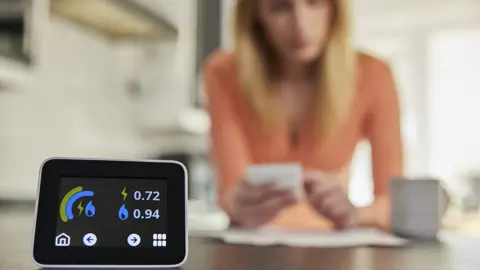Energy Bills Support Scheme: People could 'cash out' £600 payment
 Getty Images
Getty ImagesThe government is looking at ways to allow people in Northern Ireland to spend a £600 energy credit on things other than electricity.
The payment is due to go to all households as a credit to their electricity account.
But the energy minister said there was "no point" having an electricity credit which does not help with other costs.
It is understood work on the scheme is now focusing on how people can "cash out" some or all of the credit.
The additional work means it is increasingly likely that the payment will not be made until after Christmas.
Cashing out should be straightforward for people who pay quarterly or by monthly direct debit.
They could simply get their supplier to make a bank transfer.
However, it will be more of a challenge for the 375,000 households which use pre-payment meters.
Voucher idea
Graham Stuart, who is minister of state for energy and climate, told the House of Commons that the issue of cashing out was "the sticking point" and was being worked on.
It is understood that some form of voucher is one idea that has been floated but no final decisions have been made.
The Energy Bill Support Scheme was first announced by the government in May.
In England, Scotland and Wales energy bills will be cut by £400.
This will be applied over six months, with a reduction of £66 in October and November, and £67 every month between December and March 2023.
Northern Ireland has a different energy market and delivery of a scheme has been complicated by the lack of an executive.
Northern Ireland households are also getting an additional £200 in recognition of the unique characteristics of the market.
Originally, a payment of £100 was supposed to go to people who use home heating oil.
But in the autumn statement the Treasury doubled the amount and said it will be a universal payment "in recognition of the prevalence of alternative fuel usage in Northern Ireland".
